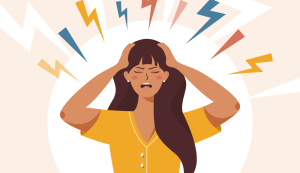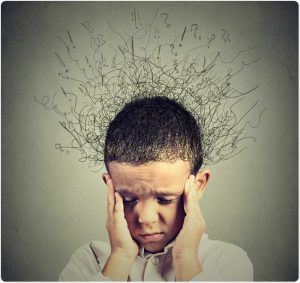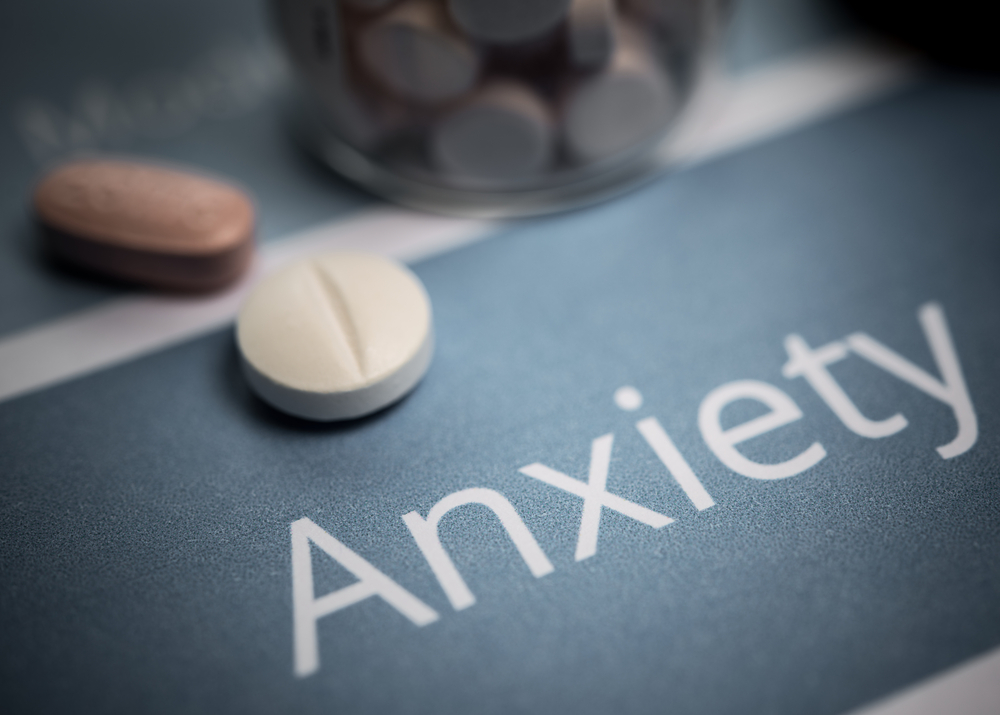Anxiety is a mental health disorder that affects millions of people all over the world. It can cause feelings of fear, dread, and panic in people who suffer from it. While there are many different ways to treat anxiety, one popular option is anxiety medication. This blog post will discuss all anxiety medication, including what it is, how it works, and the benefits and side effects of taking it. If you are struggling with anxiety and are looking for a treatment option, read on to learn more about anxiety medication.
Contents
- 1 What Is Anxiety?
- 2 Signs of Anxiety
- 3 Causes of Anxiety
- 4 Negative Impacts of Anxiety
- 5 How To Treat Anxiety?
- 6 Anxiety Medication
- 7 Types of Anxiety Medications
- 8 Different Names of Anxiety Medications
- 9 Benefits of Anxiety Medications
- 10 Side-Effects of Anxiety Medications
- 11 Conclusion
- 12 A Word From Therapy Mantra
What Is Anxiety?
 Anxiety is a feeling of worry, nervousness, or unease. Everyone experiences anxiety at some point in their life. It can be helpful in small doses because it can make you more alert and focused. However, when someone experiences anxiety on a regular basis, it becomes a problem.
Anxiety is a feeling of worry, nervousness, or unease. Everyone experiences anxiety at some point in their life. It can be helpful in small doses because it can make you more alert and focused. However, when someone experiences anxiety on a regular basis, it becomes a problem.
Anxiety disorders are the most common mental illness in the United States. They affect 40 million adults or 18% of the population. That’s about one in five people. This is one of the most common disorders all across the world.
There are different types of anxiety disorders, but the most common is Generalized Anxiety Disorder (GAD), Panic Disorder, and Social Anxiety Disorder.
Signs of Anxiety

There are many signs of anxiety, but some of the most common are:
Feeling Overwhelmed Or Out of Control
This means that you feel like you can’t handle everything that’s going on. You may feel like you’re losing control or that things are moving too fast.
Anxiety can cause problems sleeping. This is because when your mind is racing, it’s hard to calm down and relax enough to fall asleep.
Muscle Tension
When someone is anxious, they often have muscle tension. This can be in the form of headaches, neck pain, back pain, or stomach aches.
Irritability Or Anger
Anxiety can make people irritable and angry. They may snap at others easily or have a hard time controlling their temper.
Frequent Urination
This happens because anxiety causes the body to release a lot of adrenaline. This hormone causes the kidneys to produce more urine.
Difficulty Concentrating
Anxiety can make it hard to focus on anything. You may feel like your mind is foggy or that you can’t think straight.
Racing Heart
This sign also happens because of the adrenaline. When your heart races, it’s a sign that you’re in fight or flight mode.
Causes of Anxiety
 In the who world there are many causes of anxiety. Some people are more prone to anxiety than others, but there are many things that can trigger it.
In the who world there are many causes of anxiety. Some people are more prone to anxiety than others, but there are many things that can trigger it.
Some common causes of anxiety include:
Stress At Work Or School
This is one of the most common causes of anxiety. When you’re under a lot of stress, it’s hard to not feel anxious.
Traumatic Events
A traumatic event can be something like a car accident, natural disaster, or being attacked or threatened.
Negative Thoughts
If you have negative thoughts constantly running through your head, it can lead to anxiety.
Drugs And Alcohol
Using drugs or alcohol can increase your risk of developing an anxiety disorder.
Health Problems
Anxiety can also be caused by certain health problems like heart disease, asthma, or thyroid problems.
Negative Impacts of Anxiety

There are many negative impacts of anxiety. Here are some of the most common:
Affects Quality of Life
Anxiety surely has a huge impact on the quality of life. People who suffer from anxiety disorders often have to miss work, school, or social activities because they’re too anxious to participate.
Can Lead To Depression
Anxiety can lead to depression if it’s not treated. The two conditions often go hand in hand.
Increases Risk of Other Mental Illnesses
People who have anxiety are also at a higher risk for other mental illnesses like bipolar disorder and obsessive-compulsive disorder.
Leads to Substance Abuse
Anxiety can sometimes lead people to turn to drugs or alcohol as a way to self-medicate. This only makes the problem worse in the long run.
How To Treat Anxiety?

There are many ways to treat anxiety disorders. The most common are therapy, medication, and self-help groups.
Medications
Medications are one of the most common treatments for anxiety disorders. There are many different types of medications that can be used to treat them.
Medications can be helpful in reducing the symptoms of anxiety, but they don’t work for everyone. It’s important to talk to your doctor about what medications might be right for you.
Therapy
Therapy is another common treatment for anxiety disorders. This involves talking to a therapist about your thoughts and feelings.
Therapy can help you learn how to manage your anxiety and deal with stressful situations.
Self-Help Groups
Self-help groups are a type of support group that can help people dealing with mental health problems like anxiety. In these groups, people share their experiences and give each other support.
There are many different self-help groups out there, so it’s important to find one that fits you best.
Self-Care Strategies
Some self-care strategies that can help reduce anxiety include:
This is a great way to release tension and stress.
- Staying Connected To Friends And Family
It’s important to have people you can rely on when you’re feeling anxious.
- Eating Balanced Diet
A balanced diet can help keep your moods stable and prevent anxiety from occurring.
- Getting Enough Sleep
When you’re well-rested, it’s easier to deal with stressors.
Anxiety Medication
 Medications are one of the main types of treatment that one can receive for anxiety. There are different types of medications that your doctor may prescribe, including antidepressants, benzodiazepines, and beta-blockers.
Medications are one of the main types of treatment that one can receive for anxiety. There are different types of medications that your doctor may prescribe, including antidepressants, benzodiazepines, and beta-blockers.
Each medication works differently for each person, so it is important to talk to your doctor about what might be the best fit for you.
There can be many benefits a swell as drawbacks to taking anxiety medication. Some people may feel like the medication takes away their personality or makes them feel “zombie-like.” Others may find that the medication helps them control their anxiety and allows them to live a more normal life.
It is important to weigh the pros and cons of taking medication before you decide if it is right for you.
Types of Anxiety Medications
 There are many types of anxiety medications such as antidepressants, benzodiazepines, and beta-blockers.
There are many types of anxiety medications such as antidepressants, benzodiazepines, and beta-blockers.
Each medication has different benefits and drawbacks that you should discuss with your doctor before starting any type of therapy.
Some of the most common anxiety medications are:
Antidepressants
Antidepressants are a type of medication that is used to treat depression. However, they can also be helpful in treating anxiety disorders.
There are many different types of antidepressants, so it’s important to find one that works best for you.
Benzodiazepines
Benzodiazepines are a type of medication that is used to treat anxiety disorders. These drugs work quickly to calm down the symptoms of anxiety.
However, benzodiazepines can be addictive and should be taken with caution.
Beta-Blockers
Beta-blockers are a type of medication that is used to treat heart conditions. However, they can also be helpful in treating anxiety disorders.
Beta-blockers work by blocking the effects of adrenaline on the body. This can help reduce the symptoms of anxiety.
Different Names of Anxiety Medications

There are many different medications naming conventions for anxiety medications.
Some of the most common names are:
SSRIs
SSRI stands for Selective Serotonin Reuptake Inhibitors. These are a type of antidepressant that works by increasing the levels of serotonin in the brain.
SNRIs
SNRI stands for Serotonin and Norepinephrine Reuptake Inhibitors. These are a type of antidepressant that works by increasing the levels of both serotonin and norepinephrine in the brain.
TCAs
TCA stands for Tricyclic Antidepressants. These are a type of antidepressant that works by blocking certain receptors in the brain.
MAOIs
MAOI stands for Monoamine Oxidase Inhibitors. These are a type of antidepressant that works by inhibiting an enzyme in the brain.
SSRIs, SNRIs, TCAs, and MAOIs are all examples of anxiolytic medications.
Your doctor may prescribe you one or more of these types of drugs to help treat your anxiety disorder.
It is important to take your medication as prescribed and talk to your doctor if you have any questions or concerns.
Benefits of Anxiety Medications

There are many benefits of anxiety medications.
Some of the most common benefits are:
Reduces Anxiety Symptoms
Anxiety medications can help reduce the symptoms of anxiety. This can allow you to live a more normal life and perform tasks that may have been difficult before.
Improves Mood
Many people find that their mood improves when they start taking anxiety medication. This is because serotonin, one of the main chemicals affected by antidepressants, plays a role in both mood and anxiety.
Increases Concentration
Some people find that they are able to concentrate better when they are taking anxiety medication. This is because the medication helps to calm down the symptoms of anxiety which can interfere with focus.
Side-Effects of Anxiety Medications

There are many side effects of anxiety medications.
Some of the most common side-effects are:
Drowsiness
Many people find that they become drowsy when they start taking anxiety medication. This is because the drugs can cause a person to feel sleepy or relaxed.
Weight Gain
Many people gain weight when they start taking anxiety medication. This is because the drugs can cause a person to eat more than usual or have a slower metabolism.
Sexual Dysfunction
Many people find that their sex drive decreases or they have difficulty achieving an orgasm when they are taking anxiety medication.
Irritability
Some people find that they become irritable when they start taking anxiety medication. This is usually due to the fact that the medications can change your mood.
It is important to talk to your doctor if you are experiencing any of these side effects. They may be able to adjust your medication or offer you a different treatment.
Conclusion
Anxiety is a condition that many people deal with on a daily basis. There are many different types of anxiety medications that can help to reduce the symptoms. It is important to talk to your doctor if you are experiencing any side effects or have any questions about your medication. You may find that one type of medication works better for you than another. The benefits of taking anxiety medication should outweigh the risks. Always consult a doctor while taking them.
A Word From Therapy Mantra
Your mental health — your psychological, emotional, and social well-being — has an impact on every aspect of your life. Positive mental health essentially allows you to effectively deal with life’s everyday challenges.
At Mantra Care, we have a team of therapists who provide affordable online therapy to assist you with issues such as depression, anxiety, stress, relationship, OCD, LGBTQ, and PTSD. You can take our mental health test. You can also book a free therapy or download our free Android or iOS app.


